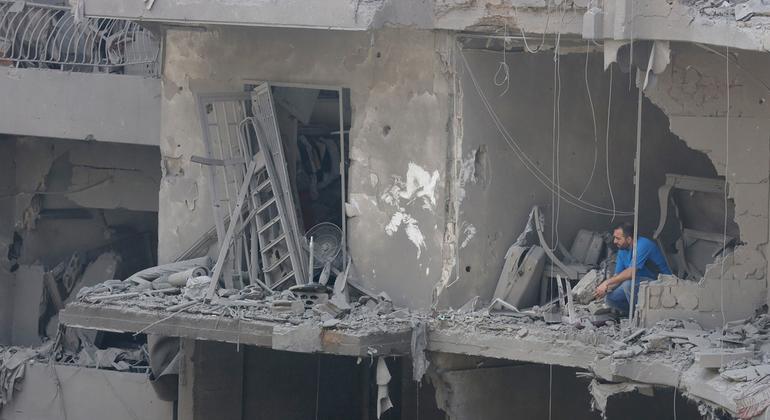The UN human rights chief adds his voice to urgent calls to reduce tensions in the Middle East


The development took place when the United Nations Secretary General António Guterres condemned “escalation after escalation” in the Middle East on Tuesday, as a report from his Office highlighted the expansion of Israeli settlements in the occupied West Bank, including all of East Jerusalem.
The report notes that since the October 7 attack, settlement activities have increased markedly, reaching record numbers on April 30, leading to widespread human rights violations.
Before the meeting of Security Council in New York about the state of emergency on Wednesday, the head of the United Nations High Commissioner for Human Rights Volker Türk called for an immediate reduction in tensions. “I appeal to all nations, including members of the Security Councilact resolutely to prevent a wider conflict in the Middle East with potentially devastating consequences for civilians,” he said. “It is important that they use their voice and influence to bring the warring parties to the negotiating table to end this.”
Dynamics of the Human Rights Council
Meanwhile, in Geneva, a meeting was scheduled Human Rights Council on the Occupied Palestinian Territory was conducted. Twenty-four of the forum’s 47 members spoke, along with 36 countries with Observer status, as delegations stressed the need to end the war in Gaza and release all Israeli hostages.
They also expressed deep concern about the dangerous escalation in the region between Hezbollah and Israel, amid reports of clashes between Hezbollah and the Israeli army within the demarcation line patrolled by the United Nations and Iran’s targeting of Israel with missiles.
Nearly a year since Hamas-led attacks in Israel left more than 1,250 people dead and more than 250 arrested, countries including Chile have condemned the October 7 outrage and noted that “not only was the return of all hostages held by Hamas not achieved, but the goal was also not achieved.” Israel has also conducted a comprehensive siege on the Palestinian population in Gaza.”
The South American delegation also spoke out in support of the new global alliance seeking a two-state solution to the Israeli-Palestinian conflict. The initiative was announced on the sidelines of the United Nations General Assembly last month by co-hosts Saudi Arabia, the European Union, Norway and other member states, with about 90 countries attending, including nearly 60 foreign ministers.
Malaysia, on behalf of a group of Asian countries at the session of the Human Rights Council, expressed support for Resolution of the United Nations General Assembly passed overwhelmingly on September 17 demanding an end to Israel’s occupation of Palestine.
The Malaysian delegation also condemned what it called “Israel’s deliberate targeting of refugee camps” in the West Bank and defended its role. UNRWA – the largest humanitarian agency in Gaza – which it said continues to face efforts by Israel and some of its allies to “dismantle and replace” it.
Iran’s stance
Israel – which was not present in the debate – faces new accusations from countries including South Africa of committing genocide against Palestinians with impunity, Iranian Foreign Minister Abbas Alaki also repeated this allegation. “Every moment of inaction leads to the continued slaughter of innocent Palestinian and Lebanese civilians,” he said via video message, calling for accountability and the establishment of a mechanism. special international human rights mechanism “to investigate and record” alleged “criminal acts”. of Israel “in Gaza, Rafah, Lebanon and across the board [of] Asia”.
Countries including the United Arab Emirates reiterated the need for unhindered humanitarian access to Gaza, while Senegal noted that the war in Gaza has not spared “both women, children, as well as critical infrastructure” and it remains “an open wound on our collective conscience”.
The situation has worsened in the West Bank, where Israeli military operations targeting Hamas members and attacks by Israeli settlers have also had negative impacts on people’s “most basic rights.” Palestine, Senegal asserted, in the debate on the human rights situation in the Occupied Palestinian Territory. available on webtv.un.org


